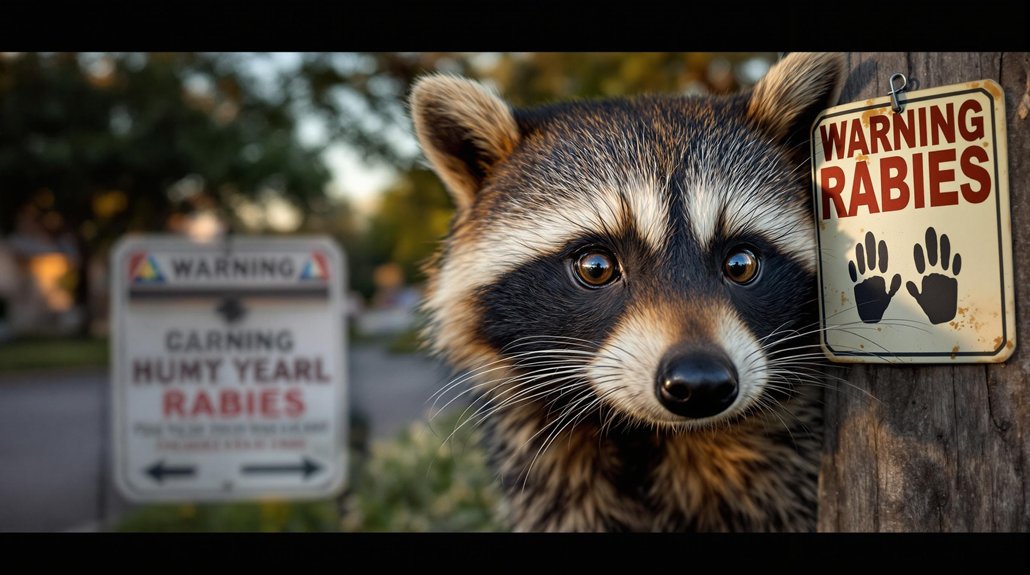Wildlife in Texas is a serious threat as carriers of rabies. Species like bats and foxes often transmit this virus to humans and pets. Infected animals may show signs of aggression or unusual calmness. Encounters with these animals can lead to bites, increasing the risk of rabies. Vaccination and public awareness are essential for prevention. Understanding the behavior and signs of rabid animals can help keep everyone safe. More information is available on how to stay protected.
Key Article Highlights
- Wildlife, including bats and foxes, are significant rabies carriers in Texas, posing risks to both humans and pets.
- Rabid animals may exhibit aggressive behavior, disorientation, and unusual calmness, indicating potential infection.
- Environmental factors and wildlife population density increase the likelihood of rabies transmission in local areas.
- Vaccination campaigns for pets and public awareness are crucial for preventing rabies spread from wildlife to humans.
- Prompt reporting of rabies symptoms in wildlife can facilitate swift public health responses and enhance community safety.
Understanding Rabies: What You Need to Know
Rabies is a serious viral disease that affects mammals, including humans. It is primarily spread through rabies transmission, which occurs when an infected animal bites another animal or person. Wildlife behavior plays a significant role in this disease’s spread. Many wild animals, such as bats and raccoons, may carry the rabies virus without showing symptoms. This makes them dangerous, as they can transmit the virus unknowingly. People often encounter wildlife in parks or rural areas, increasing the risk of exposure. Understanding rabies and recognizing the signs of infected animals can help individuals protect themselves. Awareness of wildlife behavior is essential to avoid dangerous situations and maintain personal freedom in outdoor spaces. Staying informed is key to preventing rabies infections. Proper wildlife control and bat exclusion methods can reduce the risk of rabies transmission in residential areas.
Common Rabies-Carrying Wildlife in Texas
In Texas, several types of wildlife are known to carry rabies, posing risks to both humans and pets. Among these, fox populations are notable carriers. These animals often roam in search of food and may come into contact with pets or people. Bats also play a significant role in the rabies landscape, as they inhabit many areas across Texas. Their natural habitats include caves, trees, and buildings, making them common sights. The presence of rabid bats can lead to serious consequences if they bite or scratch someone. It is essential for residents to be aware of these rabies-carrying animals and to take precautions to protect themselves and their pets from potential exposure to the virus. Recognizing bat nesting signs can help identify bat activity early and reduce risk.
The Transmission of Rabies: How It Spreads
Rabies is mainly spread through bites from infected animals. Environmental factors, such as the presence of wildlife and population density, can influence how the virus spreads. Understanding these elements is essential for preventing rabies transmission in Texas.
Animal Bite Incidence
Animal bites are a significant concern when it comes to the transmission of rabies. In Texas, wildlife such as bats, raccoons, and foxes can carry the virus. When these animals bite, they can pass rabies to humans. This risk highlights the need for animal bite prevention strategies. People should be aware of their surroundings and avoid close contact with wild animals. Wildlife safety awareness plays an important role in protecting communities. Education about the signs of rabies in animals and what to do if bitten can help reduce incidents. By promoting safe behavior and understanding the risks, individuals can enjoy outdoor activities while minimizing their chances of rabies exposure. Awareness and caution are key to staying safe.
Environmental Factors Influencing Spread
Wildlife interactions are influenced by various environmental factors that can facilitate the spread of rabies. Climate impact plays a significant role, as changes in temperature and weather patterns can affect animal behavior and populations. For example, warmer temperatures may lead to increased activity among rabies carriers like bats and raccoons. Urban development also alters habitats, bringing wildlife closer to human populations. This close contact increases the chances of transmission. As cities expand, natural barriers decline, allowing more animals to roam freely. Both climate changes and human activities create environments where rabies can spread more easily. Understanding these factors is essential for managing and preventing rabies outbreaks in Texas.
Signs and Symptoms of Rabies in Animals
As the disease progresses, infected creatures often exhibit a range of noticeable signs and symptoms. Changes in animal behavior become evident, with affected animals showing increased aggression or unusual calmness. They may become disoriented and have difficulty walking, indicating neurological changes. Other signs include excessive drooling, difficulty swallowing, and seizures. Animals may also display a lack of fear towards humans, approaching them in an abnormal manner. These symptoms can vary by species but generally indicate a serious health concern. It is essential for individuals to recognize these signs to protect themselves and others. Understanding these symptoms can help in taking timely action, potentially preventing further spread of rabies among wildlife and domestic animals alike.
Risks to Pets: Keeping Your Animals Safe

Many pet owners may not realize the risks that rabies-infected wildlife pose to their animals. Pets can encounter these animals during outdoor activities, making it vital to take precautions. Making sure pets have up-to-date vaccinations is essential in protecting them from rabies and other diseases.
Pet owners must be aware of the dangers of rabies-infected wildlife and prioritize vaccinations to protect their pets.
To keep pets safe, consider the following tips:
- Regular pet vaccinations: Make sure pets receive their rabies shots and other necessary vaccinations on schedule.
- Supervised outdoor activities: Always supervise pets when they are outside to prevent encounters with wild animals.
- Secure living areas: Fencing and barriers can help keep wildlife away from pets at home.
Human Exposure: What to Watch For
Human exposure to rabies can occur through bites or scratches from infected animals. It is important to recognize the symptoms of rabies infection, which can include fever, confusion, and paralysis. Certain wildlife species, such as bats and raccoons, are known to carry the virus and pose a higher risk to humans. Understanding raccoon nesting habits can help prevent encounters that lead to bites or scratches. Additionally, being aware of humane raccoon trapping techniques can reduce the likelihood of dangerous interactions.
Symptoms of Rabies Infection
What signs should one look for when suspecting rabies infection? Understanding the symptoms overview is fundamental. Rabies can lead to serious neurological effects, and early detection can be lifesaving.
Here are key symptoms to watch for:
- Fever and headache: Initial signs often resemble flu-like symptoms.
- Confusion or agitation: Neurological effects may cause unusual behavior.
- Hydrophobia: Difficulty swallowing and fear of water are common later symptoms.
Individuals exposed to rabies should remain vigilant. If these symptoms appear after a potential exposure, it is essential to seek medical help immediately. Early intervention can prevent the virus from progressing and improve outcomes for those affected. Awareness of these signs is important for safety.
High-Risk Wildlife Species
Certain wildlife species pose a higher risk for transmitting rabies to humans. High-risk species include raccoons, bats, skunks, and foxes. These animals often have unpredictable wildlife behavior, making them more likely to bite when threatened or cornered. People should be cautious when encountering these animals, especially if they appear sick or disoriented. Observing wildlife from a safe distance is essential. Avoiding direct contact helps reduce the risk of rabies exposure. Additionally, pet owners should make certain their pets are vaccinated against rabies to protect both their animals and themselves. Education about these high-risk species and their behaviors can empower people to enjoy nature safely while remaining aware of potential dangers.
Rabies Prevention: Vaccination and Awareness
Rabies prevention relies heavily on vaccination and public awareness. Vaccination campaigns are essential to protect pets and livestock from rabies. These efforts help reduce the risk of transmission from wildlife to humans. Public awareness also plays a key role in keeping communities safe from rabies.
- Educate the community about rabies and its dangers.
- Encourage pet owners to vaccinate their animals regularly.
- Promote reporting of any suspicious wildlife encounters.
Through these actions, people can enjoy their freedom while protecting themselves and their loved ones from rabies. By understanding the importance of vaccination and staying informed, communities in Texas can work together to minimize the risks associated with wildlife as rabies carriers. Awareness and action are crucial for a safer environment.
Reporting and Responding to Wildlife Encounters
Recognizing signs of rabies in wildlife is essential for safety. Individuals should know how to respond during encounters and follow proper reporting procedures. Understanding these steps can help prevent the spread of rabies in Texas.
Recognizing Rabies Symptoms
When encountering wildlife, it is essential to be aware of the signs of rabies. Recognizing symptoms can help individuals stay safe. Distinguishing signs of rabies in animals is important for prevention.
- Unusual behavior, such as aggression or extreme tameness
- Excessive drooling or foaming at the mouth
- Difficulty in movement or paralysis
These symptoms may indicate that an animal is infected with rabies. It is important to observe wildlife from a distance and avoid any contact. If an animal exhibits these symptoms, it is best to report it to local wildlife authorities. Understanding these signs can empower individuals to protect themselves and their community from the dangers of rabies.
Safe Encounter Protocols
Understanding the symptoms of rabies is vital for safety in wildlife encounters. To guarantee wildlife safety, individuals should follow clear encounter guidelines. When encountering wildlife, it is important to stay calm and avoid sudden movements. Observing the animal from a safe distance is advisable, as this reduces stress for both the person and the animal. If the animal appears sick or aggressive, backing away slowly is essential. Never attempt to touch or feed wildlife, as this can provoke an attack. Reporting unusual behavior in wildlife is also important for community safety. By following these simple protocols, individuals can enjoy nature while minimizing risks associated with wildlife encounters and potential rabies transmission.
Reporting Procedures Explained
Reporting wildlife encounters is essential for public safety, especially in areas where rabies is a concern. Proper reporting helps authorities track rabies cases and protect the community. Individuals should follow these steps for effective reporting:
- Observe the animal’s behavior and note any signs of rabies.
- Contact local wildlife control or health departments for rabies documentation.
- Provide details about the encounter, including the location and time.
These procedures guarantee that wildlife encounters are handled properly. Quick reporting allows for a swift response, which can reduce the risk of rabies spreading. By being proactive, communities can safeguard their health and maintain a safe environment. Awareness and action are key to combating the dangers posed by wildlife carriers of rabies.
The Importance of Public Health Initiatives

Public health initiatives play an essential role in managing the risks associated with wildlife as carriers of rabies in Texas. These programs focus on increasing public awareness about the dangers of rabies and the importance of prevention. By educating the community, residents can learn how to protect themselves and their pets from potential exposure. Community engagement is also crucial; local events and outreach can bring people together to discuss wildlife safety. Through workshops and information sessions, individuals gain the knowledge necessary to avoid risky encounters with wildlife. Overall, strong public health initiatives help create a safer environment by informing people and encouraging them to take proactive measures against rabies, ultimately reducing the threat to both human and animal populations.
Promoting Safe Interactions With Wildlife
Effective communication about wildlife safety is essential for promoting safe interactions with animals in Texas. Understanding how to approach wildlife can help prevent dangerous situations and protect both humans and animals. People should be aware of safe practices to guarantee enjoyable experiences in nature.
- Keep a safe distance from wild animals.
- Avoid feeding or approaching wildlife.
- Educate others about wildlife interactions and safety.
Frequently Asked Questions
Can Rabies Be Transmitted Through Animal Bites Only?
Rabies can primarily be transmitted through animal bites, where the saliva of an infected animal enters the wound. Understanding animal behavior and recognizing rabies symptoms are important in preventing further spread and ensuring safety.
Are Certain Dog Breeds More Susceptible to Rabies?
Certain dog breeds show varying levels of susceptibility to rabies. However, effective rabies prevention measures, like vaccinations, are essential for all dogs, regardless of breed, ensuring safety and reducing the risk of transmission to humans.
How Often Should Pets Be Vaccinated Against Rabies?
Pets should receive vaccinations according to a rabies schedule recommended by veterinarians. Typically, initial vaccinations occur at a young age, followed by boosters every one to three years, ensuring pets remain protected against rabies.
What Should I Do if I Find a Dead Animal?
Upon discovering a dead animal, one should avoid direct contact. Wear gloves, and contact local wildlife authorities for proper disposal. Always practice wildlife encounter precautions to guarantee safety and minimize potential health risks.
Is Rabies Present in Texas All Year Round?
Rabies is present in Texas throughout the year. Wildlife behavior plays an essential role in rabies transmission, as animals like bats and raccoons can carry the virus, posing risks to humans and pets year-round.




























